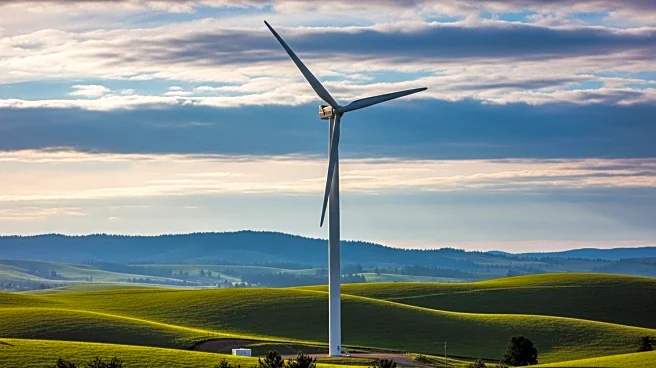What's Happening?
The U.S. renewable energy sector is experiencing significant challenges due to recent policy changes and global competition. At the annual U.S. Renewable Energy Market conference, industry leaders expressed concerns over the current administration's rollback of incentives for renewable energy, which has negatively impacted the sector. The administration's focus on supporting the fossil fuel industry has led to a difficult environment for smaller solar developers, who are now forced to restructure or sell off projects. Despite these setbacks, industry leaders remain optimistic about the future of solar energy, citing its cost-effectiveness and rapid deployment capabilities. Additionally, the industry is working to relocate more of its supply chain and manufacturing capabilities to the U.S. to strengthen its position.
Why It's Important?
The developments in the U.S. renewable energy sector have significant implications for the country's energy policy and economic future. The shift in policy priorities towards fossil fuels could hinder the growth of renewable energy, potentially affecting the U.S.'s ability to compete in the global clean energy market. This situation is further complicated by China's aggressive investments in green technology, which are reshaping the global clean-tech landscape. China's investments in solar, wind, and other renewable technologies are creating jobs and economic opportunities in numerous countries, potentially reducing U.S. influence in these regions. The U.S. risks falling behind in the global energy transition, which could have long-term economic and environmental consequences.
What's Next?
The renewable energy sector in the U.S. is likely to continue facing challenges as it navigates the current policy environment. Industry leaders may need to advocate for more supportive policies to ensure the sector's growth and competitiveness. Additionally, the U.S. may need to reconsider its approach to international energy partnerships and investments to maintain its influence in the global energy market. The upcoming climate talks could provide an opportunity for the U.S. to reassess its energy strategy and align more closely with global trends towards renewable energy.
Beyond the Headlines
The current situation highlights broader issues related to energy policy and international relations. The U.S.'s focus on short-term gains from fossil fuels contrasts with China's long-term strategy of investing in renewable energy infrastructure. This difference in approach could have significant implications for global power dynamics and the future of energy production. The U.S. may need to address these strategic challenges to remain competitive in the rapidly evolving global energy landscape.









